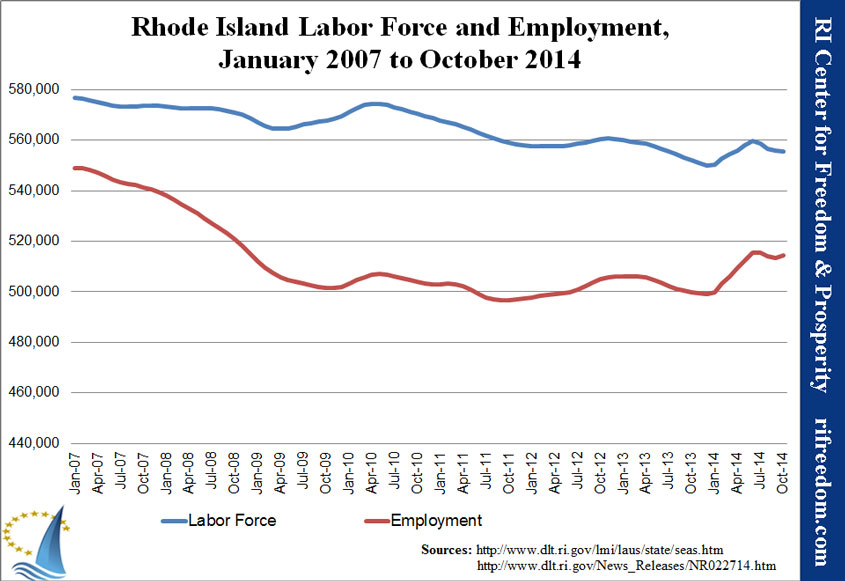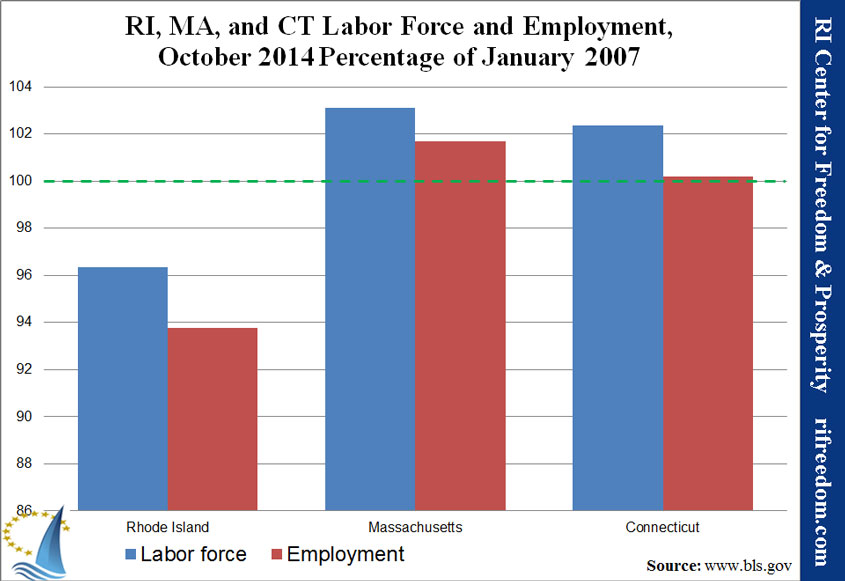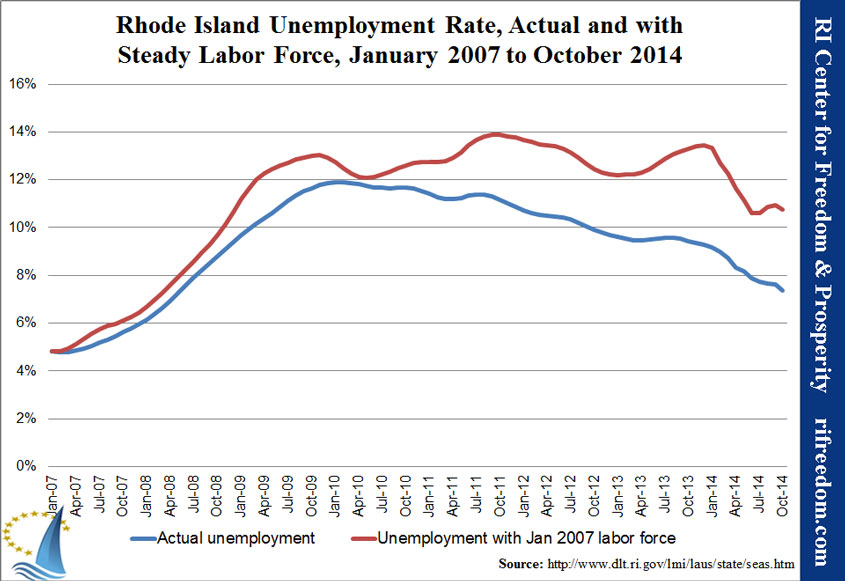RhodeMap RI: Center Responds to Grow Smart RI Misinformation
Recently, one of the members of the RhodeMap RI consortium, Grow Smart RI (GSRI), issued a statement to counter the heavy public criticism that the RhodeMap RI plan has received in recent weeks from across the state.
It should first be noted, that as RhodeMap RI itself is an outgrowth of a national agenda, that Grow Smart RI is a member of a national organization, Smart Growth America, whose mission is to advance its centralized vision for “smart growth” across the nation.
To break-down and respond to the GSRI statements, the Center has retained a national expert and opponent of sustainable living, John Anthony, who founded the “Sustainable Freedom Lab”, an organization dedicated to informing Americans about how to protect their property and business rights from the pitfalls of smart growth planning and related governmental regulations. Mr. Anthony has studied dozens of sustainable living plans similar to RhodeMap RI from across the nation.
Response to Grow Smart RI by John Anthony
In their zeal to move forward with their Economic Development plan, Grow Smart RI has attempted to “set the record straight on some of the misinformation that has been presented as fact.” In doing so, they have created several critical information gaps. The following response seeks to accurately address the concerns of community members.
CRITIQUE #1: The plan would amount to “ceding (Rhode Island’s) sovereignty to federal government agencies.”
GSRI Statement: The plan reflects the thinking of public and private Rhode Island interests. The extent to which it is implemented and what specific strategies will be used will be decided by the Governor, the General Assembly, municipal governments and private businesses and organizations. Rhode Island did not have the resources to undertake a planning process of this magnitude. Therefore, the state applied to the US Department of Housing and Urban Development’s Sustainable Communities grant program to secure the funding required for the research, writing and coordination of the public outreach effort that went into the preparation of the economic development plan. However, that research, writing and public outreach was managed by the Rhode Island Planning and guided by a Consortium made up of representatives from Rhode Island state agencies and private organizations.
Furthermore, it is critical to remember that this is a plan. The fact that it was produced with the assistance of Federal funds in no way enables Federal interests to insert themselves in decisions as to how the various strategies contained in the plan will be implemented. Those decisions rest with the State Executive and Legislative Branches, with municipal governments and with private businesses and organizations.
What GSRI did not tell you: While it is fair to say the Governor and the General Assembly can determine specific strategies, they are not free to determine many of the most important outcomes of the Economic Development plan. When the Rhode Island Division of Planning applied to HUD for a 2011 Sustainable Regional Planning Grant, the State agreed to abide by the contractual obligations contained in the HUD grant notice. Throughout the HUD notice it makes clear that anyone accepted for the grant must align themselves with the government’s “6 Livability Principles.” These principles represent a top-down centralized planning concept that has been implemented throughout the U.S. via HUD grants, with varying degrees of success and failure. In many cases the principles have led to homes becoming unaffordable, burdensome regulations and increases in traffic congestion, though their stated goal is the opposite.
Page 63 of the agreement is quite precise as it lists the “Mandatory Outcomes from the Creation of a Regional Plan for Sustainable Development.” Note, these are not choices, but rather they are demands. Failure to comply with the HUD demands can lead to court action, demands for a return of the grant money or re-direction of the funds.
Throughout the Economic Development Plan Draft there are references to fulfilling “requirements”, “alignment” with the “6 Livability Principles” and the need to dismantle “barriers among and between federal and state programs.” While superficially these terms appear beneficial, they are necessary to bring Rhode Island in closer alignment with federal demands. By virtue of accepting $1.9 million from HUD, the Division of Planning has already ceded much of their planning flexibility and choices.
CRITIQUE #2: The plan is not an economic development plan.
GSRI Statement: The draft plan was written to comply with a mandate from the General Assembly which directed the economic development corporation and the division of planning to produce a strategic plan that would include:
- A unified economic development strategy for the state that integrates business growth with land use and transportation choices;
- An analysis of how the state’s infrastructure can best support this unified economic development strategy;
- A focus and prioritization that the outcomes of the economic development strategy be equitable for all Rhode Islanders;
- Reliance on comprehensive economic data and analysis relating to Rhode Island’s economic competitiveness, business climate, national and regional reputation, and present economic development resources;
- Suggestions for improving and expanding the skills, abilities, and resources of state agencies, municipalities, and community partners to speed implementation of the plan’s recommendations; and
- The inclusion of detailed implementation plans, including stated goals, specific performance measures and indicators.
The plan, which was written with input from business leaders around the state, outlines six goals for strengthening our economy: provide educational and training opportunities to activate a 21st-century workforce; foster an inclusive economy that targets opportunity to typically underserved populations; support industries and investments that play to Rhode Island’s strengths; create great places by coordinating economic, housing and transportation investments; create a stronger and more resilient Rhode Island; and make Rhode Island a state where companies, workers, and the state as a whole can develop a competitive advantage.
It advocates strengthening the state historic tax credit program; supporting industries and investments that play to Rhode Island’s strengths including the marine, defense, arts and food sectors; better marketing of our tourism brand and assets; regulatory reform / streamlining; and “…setting fair tax policies consistent with those of other states.” The plan also asserts that expanded workforce training and a better education system are important to ensure that Rhode Island’s workforce meets the needs of employers and that the growing minority population in RI is as economically productive and self-sufficient as possible. This call for social equity has especially inflamed the most vocal critics of the plan, even though it is in the enlightened economic self-interest of all Rhode Islanders.
What GSRI did not tell you: The RhodeMap RI draft plan includes some well-considered ideas for economic development. As such the plan has drawn on business leaders to identify many of the biggest challenges to business success and attempts to design ways to “streamline regulations”, encourage “entrepreneurship”, and reduce tax burdens, “create an in-state resource” database and more.
However, the plan views economic development as encompassing virtually all social activities from where community members dwell to the number of vehicle miles inhabitants should be expected to travel. The RhodeMap RI plan is but one component of a series of plans. It draws heavily on Land Use 2025 which employs Urban Services Boundaries to enhance the “distinction” between urban and rural areas and growth centers to “coordinate investments in transportation, housing and job creation. These types of boundaries are notable for artificially inflating home prices to the point of unaffordability.
Rather than streamline those state activities such as infrastructure, taxes and regulations which directly affect businesses, thereby clearing a pathway for creativity and entrepreneurship, the RhodeMap RI plan seeks to be the driver of the economy by developing compact, human-scale networks to effect cultural issues such as “obesity”, “housing choices” and lifestyles.
It is understandable that many community members are concerned when they see that the RhodeMap RI plan goes far beyond the boundaries of economic development and so deeply into social sciences.
CRITIQUE #3: The plan is an “extreme social engineering scheme” that would “block paths to property ownership and infringe on rights of property owners.
GSRI Statement: As noted above, the General Assembly directed that the economic development strategy should “integrate business growth with land use and transportation choices,” and should include “a focus and prioritization that the outcomes of the economic development strategy be equitable for all Rhode Islanders. Responding to those directions, the plan recommends location of housing and businesses that will promote access to work opportunities. These recommendations do not infringe on the rights of property owners.
What GSRI did not tell you: For a program intended to help businesses grow, the RhodeMap RI plan spends in inordinate amount of engagement in implementing “social justice”, designing communities and guiding community members toward smaller homes in mixed-use transit-oriented urban centers. The plan attempts to mitigate the effects of climate change, using social engineering techniques mandated in the HUD grant that have had nil to adverse effects on communities that have employed them.
In a report I am preparing for the RI Center for Freedom & Prosperity, I will detail specific examples of property rights infringement by similar plans in other parts of the country.
CRITIQUE #4: The plan’s development process did not provide the public and the business community with an opportunity for input.
GSRI Statement: From the beginning RhodeMap RI has been characterized by extensive public outreach and many opportunities for public input. Over the last year and a half, public input sessions have been held in every corner of the state. The public input phase launched with coverage in the Providence Journal, and all sessions were publicized through press releases and social media. Opportunities for electronic input were also provided. The research and drafting of the economic development plan was guided by a diverse Economic Development Committee with representation from such strongly pro-business and pro growth organizations as the Greater Providence Chamber of Commerce, the Rhode Island Builders Association, the Rhode Island Nursery and Landscape Association, and the business funded Providence Foundation. In addition, the Rhode Island Foundation and Commerce RI co-hosted a series of workshops during which over 300 business leaders discussed their needs and identified ways to work together with the state to build on Rhode Island’s strengths. The State Planning Council held public hearings for the draft Economic Development Plan on October 27 and 28 at which 62 individuals testified. In all, more than 1,000 people have contributed their input.
What GSRI did not tell you:It is unfair to suggest that RhodeMap RI did not attempt to engage community members utilizing a broad outreach program that included events, social media and various forms of traditional media. It is fair and important to realize that, in spite of best efforts, the outreach program has been an epic failure. Rhode Island includes in excess of 1 million residents. Yet after a year of outreach, even if every session participant was a unique individual, the program fully engaged less than .3 of 1% of the population and barely 1% participated in surveys and other forms of feedback. To put it another way, even though 100% of the community members of Rhode Island will be effected by the RhodeMap RI plan, 99% are either unaware of the plan, unengaged or both.
When the state opts to implement planning interventions that can affect the entire community, making-up of large swaths of Rhode Islanders, as challenging as it may be, it is incumbent upon the state to engage a meaningful percentage of citizens in a transparent awareness program. That program must allow not only for feedback, but the potential recasting or rejection of the entire program. It is precisely because of the unique character of individuals and communities that planning choices involving lifestyles are best kept at the local level rather than blueprinted by the state in compliance with the demands of the federal government.
CRITIQUE #5: There is no reason not to delay passage of the Plan in order to allow for further discussion.
GSRI Statement: The draft Economic Development Plan has been developed to comply with legislation passed by the General Assembly requiring that such a plan be developed and that it be submitted on or before October 31, 2014. In 2013, the RI General Assembly passed a law directing that, “(a) The economic development corporation and the division of planning shall develop a written long-term economic development vision and policy for the state of Rhode Island and a strategic plan for implementing this policy. . . (b) On or before October 31, 2014, the economic development corporation and the division of planning shall submit the written long-term economic development vision and policy and implementation plan to the governor, the senate and the house of representatives.” The Division of Planning’s standard practice is to submit plans to the State Planning Council for approval and to have the Council hold public hearings on proposed plans. In keeping with that practice, public hearings were held and the State Planning Council vote was scheduled so that the Plan would be ready for submission to the governor, the senate and the house or representatives as close to the October 31, 2014 deadline as The RhodeMap RI Consortium signed off on the plan last week and it now goes to the State Planning Council for final adoption on November 20th.
What GSRI did not tell you: The welfare of Rhode Islanders is too important to be forced into having to accept a poorly understood and expansive economic program merely because of a state deadline. More than likely, if it benefits the majority of citizens, the legislature could be convinced to reschedule the deadline. This would provide the Division of Planning the necessary time to better differentiate the social engineering aspects of the plan from those of pure economic development and study more fully the consequences of implementing the 6 Livability Principles as a solution for improved health, mitigation of climate change, social equity and improved lifestyles.
Further, a group of five bi-partisan state lawmakers pledged in a November 2014 letter to the Division of Planning that they would provide a legislative time extension so that the concerns about RhodeMap RI could be further vetted in public.





